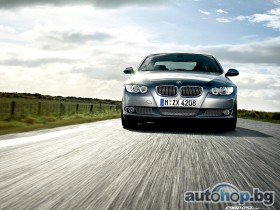SPECIAL VERSION VOLVO C30 BELOW 4.5 L/100KM
In parallel with Volvo Cars' focus on biofuels and hybrid technology, energy-effiency improvements are continuously being made to the company's conventional drivelines. The special version of the Volvo C30 called Efficiency has a fuel consumption below 4.5l/100 km, and CO2 emission below 120 g/km. Additionaly, Volvo Cars will introduce a Powershift gearbox that reduces fuel consumption by about 8 percent.
"We are firmly committed to lowering the fuel consumption of our conventional petrol and diesel engines. By doing this we will continuously reduce the overall CO2 emission level for our whole model range," says Magnus Jonsson, Senior Vice President Research and Development at Volvo Cars.
In 2008 Volvo Cars will introduce a Volvo C30 with a 1.6-litre turbodiesel (105 hp) that has a fuel consumption of less than 4.5 l/100 km. Volvo Cars' experts have succeeded in reducing fuel consumption by more than 0.4 l/100 km from 4.9 l/100 km which is the official figure for the C30 1.6D that is available on the market today. Translated into CO2 emissions, this is a reduction from 129 g/km to below 120 g.
"This is a science of small adjustments and gains. Many systems and details in a car model have been dimensioned to suit all engine vaiants, from the smallest diesel to the most powerful petrol unit. This gives possibilities for fine adjustments to individual engine variants, particularly the smallest alternatives," says Magnus Jonsson.
A range of measures within four main areas
The fuel consumption reduction has been achieved through measures within four main areas:
* Aerodynamics. The Efficiency has reduced chassis height, a new rear roof spoiler, a new rear bumper, underbody panels, optimised engine cooling and aerodynamically optimised 16-inch wheel rims.
* Rolling resistance is reduced with a new generation of low friction tyres
* Higher gearing. The unique gearbox variant has revised gearing on 3rd, 4th and 5th gears
* Powertrain efficiency increase. This includes new low-friction transmission oil, optimisation of steering servo assistance and engine management optimisation.
The special C30 will also get visual elements that enhance its unique character.
Cash-back in Sweden
In Sweden, a conventional car with carbon dioxide emissions of 120 g/km or less is classified as an environmental car. This entitles private new-car buyers to a state-provided cash-back of 10,000 kronor (SEK).
"These measures are positive both for the customer and for the environment. The car owner gets a Volvo C30 with the very same sporty feel and appearance, with the added benefit of even better fuel economy and, in some countries, tax incentives. At the same time, emissions of carbon dioxide are cut by about 8 percent," explains Magnus Jonsson.
Powershift reduces consumption by 8 percent
In early 2008 Volvo Cars will introduce a new gearbox with a so-called Powershift feature. Powershift cuts fuel consumption by about 8 percent compared with today's automatic transmissions. It will be available in the Volvo C30, S40 and V50 with the 2-litre turbodiesel (2.0D) engine.
Put simply, one could say that Powershift consists of two manual gearboxes that work in parallel and are controlled by separate clutches. Since there is no disruption in torque delivery during the gearchanging process, gearshifts are instantaneous and the efficiency rating is higher.
Developments in petrol and diesel engines
The environment is in constant focus as Volvo Cars initiates continuous improvements in its other petrol and diesel engines.
For petrol engines, the company's experts are examining how direct-injection technology can be further refined and they are also looking at even more advanced control of both the air/fuel mixture and valve control.
"When it comes to diesel engines, it isn't fuel consumption that is the greatest challenge. Here the main challenge is to meet the increasingly tough demands on regulated emissions such as nitrogen oxides and particulates without jeopardising the diesel engine's already low fuel consumption," says Magnus Jonsson.

 Unique multimedia Eos with AEZ-Nemesis forged rims
Unique multimedia Eos with AEZ-Nemesis forged rims
August 20, 2007

 И Daihatsu стана на 100
И Daihatsu стана на 100
August 22, 2007
Comments
There are no comments yet. Be the first one to express yourself!










